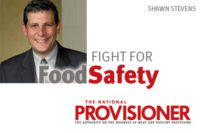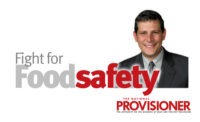For some time, we have warned food industry companies — specifically meat and poultry companies — about the necessity to appropriately protect themselves and their brands against the risk posed by Salmonella recalls. The U.S. Department of Agriculture’s Food Safety and Inspection Service (FSIS) and U.S. Food and Drug Administration (FDA) both readily acknowledge that Salmonella is prevalent in raw poultry and meat products, including in-the-shell eggs, and have not declared it an adulterant in these products. Even so, the number of Salmonella recalls has steadily increased. This dichotomy presents a number of unique legal and commercial perils that food companies need to be aware of.
There are three primary things companies can do to protect themselves from the unique risks posed by Salmonella. The first is obvious: Continue doing everything possible to eradicate Salmonella from your products. Given the prevalence of Salmonella, this is an extremely difficult outcome to achieve.
Second, procure recall insurance that provides coverage for Salmonella-related recalls. This may not be as straightforward as it sounds. Many insurance policies limit coverage to recalls arising from declared adulterants. The last thing anyone wants is to realize that their recall insurance does not provide coverage for the peril at issue. Review your policy and confirm the existence of coverage for Salmonella-related events. During the review, pay special attention to any policy exclusions. These exclusions may fundamentally alter the coverage you think you have. In short: Read the fine print.
Understand the insurance company is not your friend. There is no shortage of bad actors in the insurance industry who are more than happy to collect premiums but will fight you tooth and nail when it comes time to pay a claim. We often see the very same insurance companies engaging in improper claim denials time and again. So, do your due diligence when choosing your policy and your insurer.
The next thing is to periodically review and reevaluate any agreements with your suppliers and customers. This applies upstream and downstream to contracts, agreements, terms, and conditions, etc. Relationships change over time. Often, the terms we originally bargained for become obsolete and cease to effectively offer the protections we expect. The middle of a crisis is no time to realize that you are without recourse for a supplier’s mistake. You should also require your suppliers to carry recall insurance that cover you as an additional insured. This provides an extra layer of protection in case something goes wrong. In terms of any supplier guarantee, make certain indemnity is triggered for all recalls, regardless of pathogen.
Protecting your business and your customers requires foresight. By continually seeking to improve food safety, purchasing appropriate recall insurance and carefully evaluating the contractual relationships you are a party to, you maximize the likelihood of surviving a crisis.




